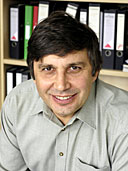Apr 14 2009
Andre Geim developed the first two-dimensional crystals made of carbon atoms. These graphenes not only promise to revolutionize semiconductor, sensor, and display technology, but also lead us to expect breakthroughs in basic research in quantum physics.
 Andre Geim
Andre Geim
The Körber European Science Award for 2009, worth 750,000 euros in prize money, goes to Andre Geim. The Dutch physicist has distinguished himself through his pioneering studies in the field of two-dimensional carbon crystals. The Award is being presented for the twenty-fifth time and the ceremony will take place on April 17, 2009, in Hamburg’s city hall. It honors European scientists who are pursuing particularly innovative research projects. The recipient was selected by an international trustee committee chaired by the President of the Max Planck Society, Prof. Dr. Peter Gruss.
In 2004, Andre Geim succeeded in producing the first two-dimensional crystals ever created. They consist of a single layer of individual, densely packed carbon atoms that are woven into one stable layer like a wire mesh but made of atoms. These so-called graphenes are truly two dimensional since they are only one layer of atoms thick. In the world of atoms, nothing can be flatter. They thus represent a completely new class of material since all previously known materials were three dimensional. Just as pioneering are the technologies that can be developed using graphenes.
Among other things, Geim has succeeded in using graphene to develop prototypes of tiny transistors. They are some 10 times smaller than the smallest of the traditional prototypes, and they switch using a single electron. In the not all too distant future, graphene transistors could replace transistors made of silicon, which – packed by the millions into microchips – today form the heart of practically all consumer electronics equipment, from flat-screen TVs to computers to cell phones. It will be very difficult to further miniaturize circuits made of silicon. Semiconductor manufacturers are now reaching the limits of what is physically possible. In the world of microelectronics, the even finer structures of graphene transistors represent "faster" and "energy saving".
Graphene layers – which are approximately a million times thinner than a sheet of paper – could, furthermore, be applied to panes of glass and to monitors. The layers conduct electricity and change their opacity when a voltage is applied, much like the liquid crystals in flat screens do. This will make it possible, among other things, to manufacture window panes that regulate the passage of sunlight "intelligently". Graphene technology also holds the promise of novel types of flat-screen displays and extremely sensitive chemical sensors.
Graphenes also provide quantum physicists an extremely interesting new field of research. Charge carriers in graphenes do not behave as normal electrons, but like massless relativistic particles (comparable to neutrinos but with an electrical charge). This makes it possible for physicists to study quantum phenomena on their lab table, something for which they until now needed huge and expensive particle accelerators.
Andre Geim, who has been professor of physics at the British University of Manchester since 2001, was born in Russia in 1958 to German parents. He studied physics in Moscow and was awarded his Ph.D. by the Institute for Solid State Physics in Chernogolovka, Russia, in 1987. After working there for another 3 years, he conducted research in England and Denmark. In 1994, he was appointed Associate Professor at the University of Nijmegen in the Netherlands. In 2001 he moved to the University of Manchester, where he is still active as professor of physics. Geim has published numerous pioneering articles and books and is considered a genius of his discipline. He was appointed a Fellow of the Royal Society in 2007.
The Award winner will be presented to the public Tuesday, November 11, at 7 pm at a science forum organized by the Hamburger Abendblatt newspaper, NDR 90,3 radio, and the Körber Foundation at the KörberForum – Kehrwieder 12, 20457 Hamburg.